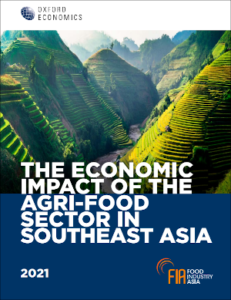Economic Impact | 22 Jun 2021
The Economic Impact of the Agri-Food Sector in Southeast Asia

A comprehensive study of the economic impact of Southeast Asia’s Agri-food sector in 2019, with deeper analysis into the impact of the COVID-19 pandemic and the policy challenges faced by the sector in the years ahead.
In 2019, the agri-food sector supported over 40% of jobs in Vietnam, Indonesia, Thailand, and the Philippines; as well as 28% of total tax revenues across the four countries.
Across the Southeast Asian region, the agri-food sector has always played a critical role in supporting the livelihoods of people: from putting food on millions of tables, to supporting local governments via tax revenues. The sector demonstrated its resilience in 2020, despite the effects of COVID-19 on travel, trade, and business operations.
However, the agri-food sector faces more challenges in the years ahead, including risks to food supply and demand, and the spectre of new public spending and taxation policies in the post-COVID recovery.
To help anticipate these risks, Oxford Economics worked with Food Industry Asia (FIA) to define and quantify the sector’s total economic impact in four major Southeast Asian economies (Indonesia, Thailand, Vietnam, and the Philippines). Our analysis spans the full range of agri-food activity, from farm-to-fork. That includes agricultural production; food and beverage manufacturing; and food and beverage distribution.
We used the Oxford Economics Global Economic Impact Model and official statistics from national databases to quantify the direct impact of the agri-food sector on GDP and employment; the indirect economic impact from supply chain spending; and the induced economic impact from consumer spending by wage earners in the sector. Finally, we developed a Fiscal Risk Framework to forecast the potential risks countries may face due to potential contractionary fiscal measures.
We found that the agri-food sector contributed USD 717 billion and supported 127 million jobs across the four Southeast Asian economies in 2019. The sector weathered the COVID-19 pandemic well during 2020. In Indonesia and Vietnam, its economic footprint grew by 2% and 4%, respectively, in real terms compared to the year before. In Thailand and the Philippines, the sector’s total economic contribution shrank, but by less than the fall in GDP, revealing the essential nature of agri-food production and distribution. The report delves into the deeper implications and economic risks each country’s agri-food sector faces in the post-COVID recovery.
 With this research, Oxford Economics helped Food Industry Asia articulate the economic importance of the sector and the policy risks its members face in the years ahead, to advocate for smart policy solutions in the challenging post-COVID-19 environment.
With this research, Oxford Economics helped Food Industry Asia articulate the economic importance of the sector and the policy risks its members face in the years ahead, to advocate for smart policy solutions in the challenging post-COVID-19 environment.
Our economic consulting team are world leaders in quantitative economic analysis, working with clients around the globe and across sectors to build models, forecast markets and evaluate interventions using state-of-the art techniques. Lead consultants on this project were:
To find out more about our capabilities, contact:
EMEA
Sam Moore
+44 (0)207 803 1415
Email
Americas
Diantha Redd
+1 (646) 384 0271
Email
Asia
James Lambert
+44 (0)203 910 8065
Email
Related Services

Post
The Economic Footprint of JLR in the UK
This report examines the economic footprint of JLR in the United Kingdom in 2024. The analysis is conducted both at the national level, as well as on the West Midlands and North West regions, where JLR’s main facilities are located.
Find Out More
Post
Airbnb’s Economic Contribution to APAC in 2024: GDP, Jobs, and Regional Impact
Airbnb's platform connects hosts across Asia Pacific (APAC) with travellers from around the world. Oxford Economics was commissioned by Airbnb to quantify its economic footprint in 10 APAC markets in 2024.
Find Out More
Post
Economic Insights: Airbnb’s Contribution Through the Lens of Oxford Economics
Oxford Economics Australia delivered a tailored economic impact assessment for Airbnb, including GDP contribution modelling, job creation analytics, guest‑spend segmentation, and regional tourism dispersion insights to underpin Airbnb’s stakeholder communications and strategic growth initiatives.
Find Out More